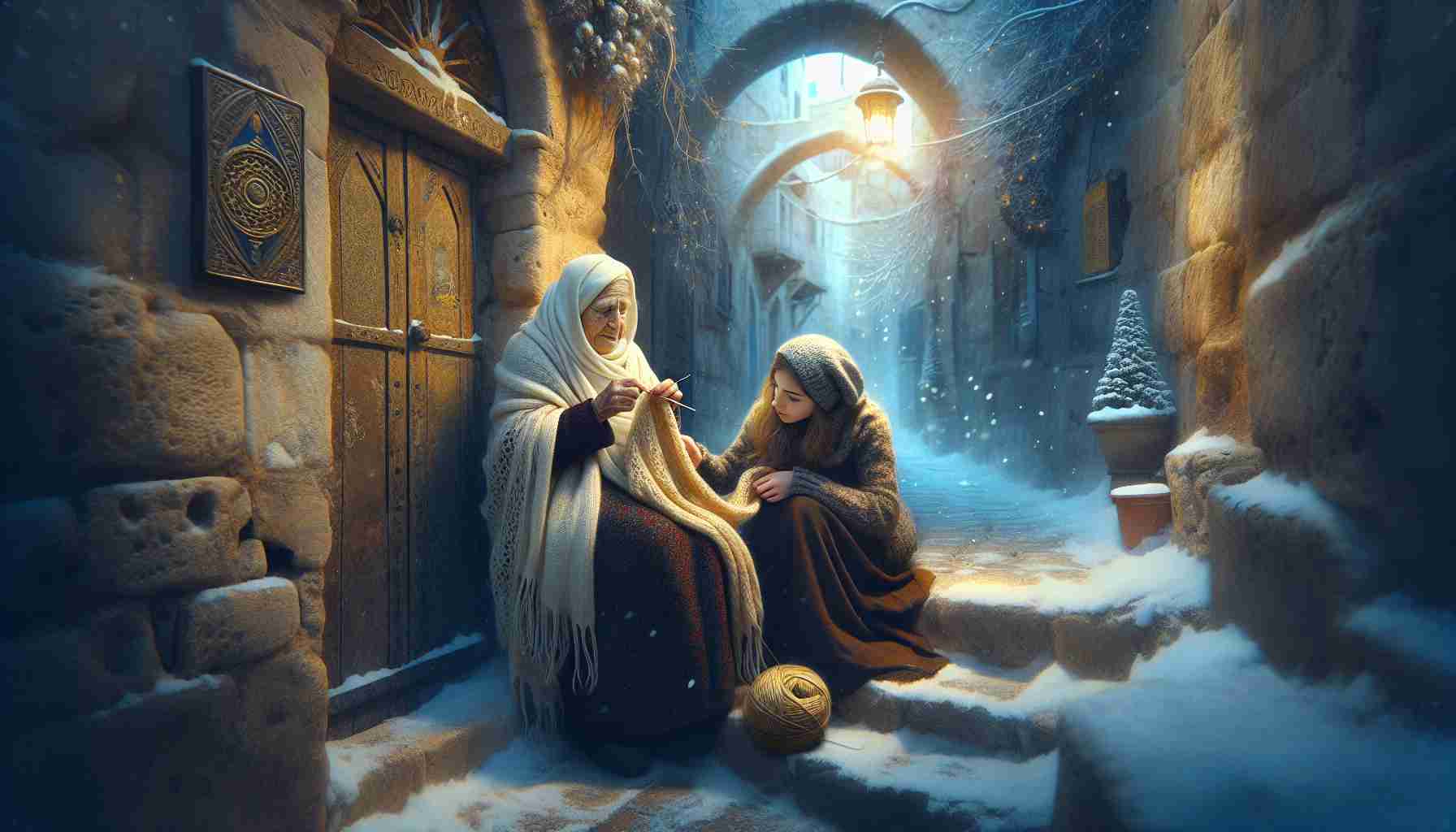

Hannah wrapped her arms tighter around herself, the chill of the early morning pressing through her sweater as she stood barefoot on the porch. The village was still half-draped in mist, the fig trees and stone walls softened by the lingering fog. She exhaled, a trembling breath, and wondered — not for the first time — if Heaven had gone silent for good.
It had been three months since the last letter from her brother, Ethan, stationed far away in a place whose name she tried not to say aloud. Three months since her father's diagnosis. Three months of unanswered prayers, of lighting Shabbat candles with whispered cries in her heart that seemed to rise and fade into nothing.
She used to think faith felt like a song — steady, beautiful. Now it felt more like breathing underwater.
She sat down on the porch steps and tucked her knees to her chest, chin resting on top. She tried to remember the stories her grandmother used to tell her — about how even when our forefathers wandered deserts and faced endless silence, G-d had never truly left them. But the silence wrapped tighter around her shoulders, heavier somehow than the mist in the air.
As the sun began to unfurl its first pale fingers across the olive trees, Hannah caught sight of something at the foot of the path: a small sprig of crimson, standing determinedly where the cracked stone gave way to an unruly patch of ground.
Curious despite herself, Hannah went closer. It was a lone poppy — brilliant and stubborn — swaying slightly in the breeze. Somehow it had rooted itself between stones, blooming where nothing should have.
Tears blurred her vision suddenly, surprising her. She crouched beside it, reaching out a trembling hand but not quite touching its fragile petals. A memory surfaced — something from Isaiah, tucked away in the corners of her mind: "I will not forget you. Behold, I have graven you upon the palms of My hands."
The words came unbidden, steadying her heart like an old song.
Hannah sat back on her heels, letting the tears fall freely now — not because she was broken, but because, somehow, she wasn’t. Somehow, even in the silence, even in the long aching waits, G-d had planted something enduring within her. Something that could still reach out toward the sun.
Later that day, Hannah lingered by the poppy again, a mug of tea warming her hands. The world still hadn’t changed — the letter hadn’t arrived, her father's health hadn’t mended overnight — but something small and steady had rooted in her chest: a whisper that she was not forsaken, not forgotten.
She didn’t have every answer yet. But she had enough to get through today. She had hope — quiet, stubborn, like the scarlet poppy defying the stones.
And sometimes, that was enough.
—
Torah and Tanakh Verses Supporting the Story:
Hannah wrapped her arms tighter around herself, the chill of the early morning pressing through her sweater as she stood barefoot on the porch. The village was still half-draped in mist, the fig trees and stone walls softened by the lingering fog. She exhaled, a trembling breath, and wondered — not for the first time — if Heaven had gone silent for good.
It had been three months since the last letter from her brother, Ethan, stationed far away in a place whose name she tried not to say aloud. Three months since her father's diagnosis. Three months of unanswered prayers, of lighting Shabbat candles with whispered cries in her heart that seemed to rise and fade into nothing.
She used to think faith felt like a song — steady, beautiful. Now it felt more like breathing underwater.
She sat down on the porch steps and tucked her knees to her chest, chin resting on top. She tried to remember the stories her grandmother used to tell her — about how even when our forefathers wandered deserts and faced endless silence, G-d had never truly left them. But the silence wrapped tighter around her shoulders, heavier somehow than the mist in the air.
As the sun began to unfurl its first pale fingers across the olive trees, Hannah caught sight of something at the foot of the path: a small sprig of crimson, standing determinedly where the cracked stone gave way to an unruly patch of ground.
Curious despite herself, Hannah went closer. It was a lone poppy — brilliant and stubborn — swaying slightly in the breeze. Somehow it had rooted itself between stones, blooming where nothing should have.
Tears blurred her vision suddenly, surprising her. She crouched beside it, reaching out a trembling hand but not quite touching its fragile petals. A memory surfaced — something from Isaiah, tucked away in the corners of her mind: "I will not forget you. Behold, I have graven you upon the palms of My hands."
The words came unbidden, steadying her heart like an old song.
Hannah sat back on her heels, letting the tears fall freely now — not because she was broken, but because, somehow, she wasn’t. Somehow, even in the silence, even in the long aching waits, G-d had planted something enduring within her. Something that could still reach out toward the sun.
Later that day, Hannah lingered by the poppy again, a mug of tea warming her hands. The world still hadn’t changed — the letter hadn’t arrived, her father's health hadn’t mended overnight — but something small and steady had rooted in her chest: a whisper that she was not forsaken, not forgotten.
She didn’t have every answer yet. But she had enough to get through today. She had hope — quiet, stubborn, like the scarlet poppy defying the stones.
And sometimes, that was enough.
—
Torah and Tanakh Verses Supporting the Story: